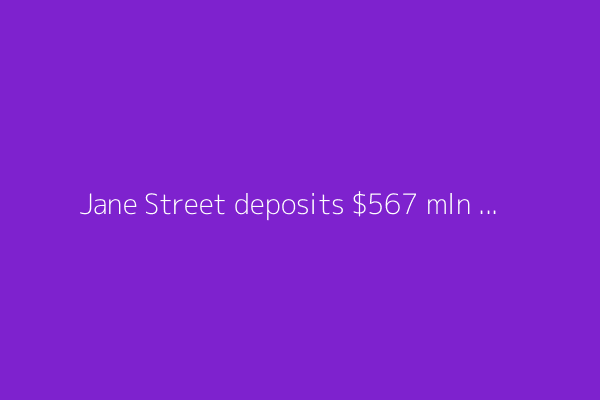See what’s trending right now
India bankingin Financial Markets
2 hours agoCitigroup's India commercial banking head exits amid trade tensions as India-US dairy sector talks risk major losses, while wholesale prices show slight relief in June.
Show me
Financial Markets
Citigroup’s India Commercial Banking Chief Vohra Exits
NeutralFinancial Markets
Citigroup's longtime commercial banking chief in India, Bhanu Vohra, is stepping down after 25 years with the bank. The move comes as part of Citi's broader restructuring efforts in the region, though it's unclear whether Vohra has another role lined up or is departing outright.
Editor’s Note: High-profile executive departures always raise eyebrows in the finance world—especially when they involve someone who's been with a company for a quarter-century. While this might just be a routine leadership shuffle, it's worth watching how Citi fills the gap in India, where global banks are battling fierce local competition. For banking insiders, the real story isn't just who's leaving, but what it says about Citi's strategy in a key emerging market.
India-US trade deal: Opening India’s dairy sector to America could cause huge losses; 'Rs 1.03 lakh crore annually…’
NegativeFinancial Markets
India is pushing back against opening its dairy and agriculture markets to the U.S. in ongoing trade talks, worried it could devastate local farmers. A State Bank of India report warns that allowing American dairy imports might cost India’s domestic industry a staggering ₹1.03 lakh crore per year—a massive hit to a sector that’s crucial for rural livelihoods.
Editor’s Note: This isn’t just about milk—it’s about protecting millions of small farmers who rely on dairy for survival. The U.S. has long wanted greater access to India’s agricultural markets, but India’s resistance shows how trade deals can pit economic growth against local vulnerability. If the government caves, it could reshape rural economies overnight. If it doesn’t, it might stall a broader trade agreement with strategic implications. Either way, farmers are caught in the middle.
India's wholesale prices ease in June
NeutralFinancial Markets
India's wholesale inflation slowed down in June, meaning the prices businesses pay for goods and services aren't rising as sharply as before. This could signal some relief for the economy, though it's still worth watching how this trickles down to consumer prices.
Editor’s Note: Wholesale price changes often hint at where consumer prices might head next. If wholesale costs keep cooling, it could mean less pressure on everyday prices—good news for households and businesses alike. But since inflation is still a global concern, this dip doesn’t mean the problem’s solved, just that there might be a slight breather.
Jane Street ban: US trading firm deposits Rs 4,843 crore in escrow account; requests SEBI to lift trading restrictions
NegativeFinancial Markets
US trading giant Jane Street is trying to get back in SEBI’s good graces after being accused of manipulating India’s derivatives market. They’ve parked a hefty ₹4,843 crore in an escrow account and are asking regulators to lift their trading ban. SEBI claims the firm artificially inflated prices of Nifty Bank stocks, cashed out massive profits (₹36,500 crore!), and left the market in chaos. Now, Jane Street’s move seems like an attempt to negotiate their way out of trouble—but regulators might not budge easily.
Editor’s Note: This isn’t just about one firm’s fines—it’s a high-stakes test of how India polices its markets. If SEBI holds firm, it sends a message that even big foreign players can’t bend the rules. But if Jane Street wriggles free, critics might question whether regulators have the teeth to stop market manipulation. Either way, it’s a wake-up call about who’s really calling the shots in India’s financial playground.
India's June wholesale prices fall for first time in 19 months
NeutralFinancial Markets
India’s wholesale prices dropped in June for the first time in over a year and a half—a surprising shift after 19 straight months of increases. This decline suggests some relief from inflationary pressures, though experts are still weighing whether it’s a temporary dip or the start of a broader trend.
Editor’s Note: Wholesale price changes often trickle down to consumers, so this could signal easing costs for businesses and, eventually, shoppers. But don’t break out the confetti yet—global fuel and food prices are still wild cards, and India’s central bank will be watching closely to see if this is a blip or a real turning point.
Jane Street Sebi ban: F&O trade volumes drop nearly 20%; both BSE and NSE shares take a hit
NegativeFinancial Markets
India's futures and options (F&O) market took a sharp hit last week, with trading volumes dropping by almost 20% after SEBI banned Jane Street, a major player, over suspected market manipulation. The sudden exit of such a big trader has left the market with less liquidity and efficiency, and even dragged down shares of both BSE and NSE as investors worry about lower earnings for the exchanges.
Editor’s Note: When a heavyweight like Jane Street gets sidelined, it’s not just about one firm—it shakes up the whole market. Less trading activity means thinner liquidity, which can make prices more volatile and hurt smaller traders. For the exchanges, lower volumes mean less revenue, so this isn’t just a regulatory headache—it’s a financial one too. Investors should keep an eye on whether this slump is temporary or if it signals deeper cracks in market confidence.
June WPI inflation turns negative at -0.13%; deflation in vegetables stands at -22.65%
NeutralFinancial Markets
India's wholesale prices actually dropped slightly in June, marking a rare dip into negative territory (-0.13%). The biggest driver? Plummeting vegetable prices, which crashed by nearly 23% compared to last year. Other essentials like fuel and manufactured goods also got cheaper, suggesting some relief for businesses after years of stubborn inflation.
Editor’s Note: This isn’t just about cheaper veggies at the market. Negative WPI hints at weakening demand in parts of India’s economy, which could ripple into jobs and investment. But for households and businesses squeezed by high costs, it’s a temporary breather—though economists will watch closely to see if this turns into a deeper slump.
India Pension Funds Said to Request Easier Bond Investment Rules
NeutralFinancial Markets
India's pension fund managers are pushing for more flexibility in how they invest workers' retirement savings. They've reportedly asked regulators to loosen strict rules about the types of corporate bonds they're allowed to buy—specifically, requirements about how long those bonds must last before maturing.
Editor’s Note: Right now, pension funds have limited options when investing in corporate bonds, which could restrict their ability to maximize returns for retirees. If regulators agree to ease these rules, it might open up better investment opportunities—but it also comes with risks if funds chase higher yields without proper safeguards. For millions of Indians relying on pensions, this could mean a more dynamic (and potentially more profitable) retirement system—or, if mismanaged, greater exposure to market swings.
Jane Street deposits $567 mln with India’s SEBI to resume trading- Money Control
PositiveFinancial Markets
Jane Street, a major global trading firm, has deposited a hefty $567 million with India’s market regulator (SEBI) to restart its trading operations in the country. This move signals the firm’s commitment to complying with local regulations and re-entering India’s fast-growing financial markets after a pause.
Editor’s Note: Jane Street’s big deposit isn’t just about paperwork—it’s a vote of confidence in India’s financial system. The firm’s return suggests that despite regulatory hurdles, global players still see India as a lucrative market worth navigating. For investors, this could mean more liquidity and competition, which often leads to better market efficiency. Plus, it’s a reminder that even heavyweight traders have to play by local rules.
Why World Pulse Now?
Global Coverage
All major sources, one page
Emotional Lens
Feel the mood behind headlines
Trending Topics
Know what’s trending, globally
Read Less, Know More
Get summaries. Save time
Stay informed, save time
Learn moreLive Stats
Articles Processed
7,179
Trending Topics
116
Sources Monitored
204
Last Updated
an hour ago
Live data processing
How it works1-Minute Daily Briefing
Stay sharp in 60 seconds. Get concise summaries of today’s biggest stories — markets, tech, sports, and more
Why World Pulse Now?
Global Coverage
All major sources, one page
Emotional Lens
Feel the mood behind headlines
Trending Topics
Know what’s trending, globally
Read Less, Know More
Get summaries. Save time
Stay informed, save time
Learn moreLive Stats
Articles Processed
7,179
Trending Topics
116
Sources Monitored
204
Last Updated
an hour ago
Live data processing
How it works1-Minute Daily Briefing
Stay sharp in 60 seconds. Get concise summaries of today’s biggest stories — markets, tech, sports, and more








